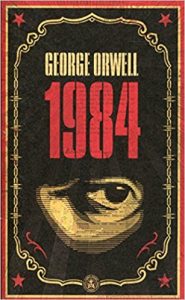
 Literature Guides
Literature Guides
Study Guide for 1984 by George Orwell
General Introduction
George Orwell’s 1984 is considered a masterpiece of dystopian fiction. Made into numerous movie versions and coopted even for television commercials, Orwell’s novel is considered to be the high point of nightmare futuristic visions of state oppression and thought control. The novel has experienced continued re-birth and relevance as the 20th and 21st centuries ushered in unprecedented forms of media control and totalitarian regimes. Many consider Orwell’s novel to be something of a cautionary tale for state power when it becomes too powerful. Certainly, the age of the internet has given 1984 a new force for stirring the imagination.
Summary
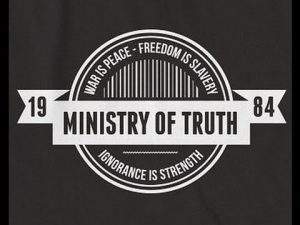
totalitarian regions into which the world is divided; the others are Eurasia and Eastasia. The ruling power, known only as the Party, is headed by a mysterious agent called Big Brother. The face of Big Brother appears everywhere on posters with the caption: “BIG BROTHER IS WATCHING YOU.”
The Party consists of four divisions: the Ministry of Love, the Ministry of Peace, the Ministry of Plenty, and the Ministry of Truth. Here we meet the protagonist, Winston Smith, who works in the records department of the Ministry of Truth. Since the Ministry of Truth must appear the source of absolute truth, Winston works as one of the functionaries whose job is to alter all records and documents so that they agree entirely with the message of the Ministry of Truth.
The white façade of the building of the Ministry of Truth bears the main slogans: “WAR IS PEACE,” FREEDOM IS SLAVERY,” and “IGNORANCE IS STRENGTH.” The party’s slogans and propaganda are broadcast on telescreens in every home and throughout the city. These telescreens also provide constant surveillance of everyone and everything in the city.
The “proles,” or proletariat, make up the majority of the population and are regarded by the party as inferior. Oceania also remains in a state of constant war with either Eurasia or Eastasia. As the novel begins, Oceania is at war with Eurasia. The Party maintains that they were never at war with Eastasia and the Ministry of Truth is altering all documents and newspapers to ensure that the truth of this state of war is consistent.
We also meet Emmanuel Goldstein who is enemy number one to the Party. Goldstein brought the party to power and now leads an underground resistance. The Party is actively engaged in capturing him and destroying him.
Winston keeps a diary in which he writes his memories of before the Party came to power, and before his parents disappeared. He also writes down his private thoughts and feelings and these are dangerous. He records thoughts too dangerous to speak aloud such as “DOWN WITH BIG BROTHER.” Any private thoughts of this kind are strictly forbidden and could get him arrested and executed. These ideas are regulated by the Thought Police and are deemed “thoughtcrimes.”
Winston realizes that the only readers of his diary will likely be the Thought Police, yet he writes them anyway. Privately, he hopes that his diary will be read by a high-ranking party member named O’Brien who Winston believes shares his anti-Party feelings. Winston is attracted to a young woman who works in the Fiction Department, but he also believes she may be secretly spying on him.
On one particular evening, Winston decides to skip the sanctioned activities at the Community Center and go for a walk by himself. He stops into a prole pub for a drink and strikes up a conversation with an older man. Winston presses the man on what he really thinks of the Party. He asks if the older man thinks things were better or worse before the revolution that brought the Party to power.
The man only mumbles vague answers. Afterward, Winston stops into the junk shop where previously he bought his diary, and buys a beautiful antique glass paperweight. While there, he chats up the proprietor, Mr. Charrington. As he is leaving the shop, he sees the woman from the Fiction Department. Fearing his suspicions about her are true, he runs home in terror.
After some time, Winston sees the same woman in the corridor of the Ministry of Truth. She has her arm in a sling and Winston sees her trip and fall. While he remains suspicious, he also feels for her and comes to her aid. At this, she slips a note to him which reads: “I love you.” They arrange to meet in secret in the countryside where they begin a love affair.
Non-procreative sex between members of the party is strictly forbidden. However, Winston sees his relationship with this sexually liberated young woman, Julia, as both thrilling and as a political act. They come to view liberated sexuality as a force which could subvert and destroy the Party.
Winston eventually rents a room above the antique shop from Mr. Charrington. This becomes the sanctuary for him and Julia. The room is extremely old-fashioned. There is no telescreen, for one thing. Winston places the paperweight in the room as a symbol of the love between him and Julia. They carve out a small oasis for their relationship to flourish and to discuss anti-Party ideas.
As if to add to the feeling of safe isolation, Winston and Julia often hear a washing woman singing in the courtyard beneath their secret room. The talk at length about how to rebel against the party, although they have no idea how to proceed or act on these ideas. They also openly talk about how the Party will one day find them out and what that will eventually mean. They know that they will be taken to the Ministry of Love, the most feared of the ministries since it deals with law and order.
They also know that they will be tortured and forced to confess all that they have done and said. But they promise that they will sustain their love for each other, that the Ministry will never be able to corrupt or compromise them. They swear that they will not betray each other or the feelings they have for each other.
One day, Winston is approached by O’Brien at the Ministry of Truth. O’Brien gives him an address to meet him. Winston is thrilled since he is now convinced about his belief that O’Brien is involved in the rebellion after all. When Winston and Julia show up at O’Brien’s apartment, they are happy to discover that he is a member of the rebellion and he recruits them for underground Brotherhood led by Goldstein. Winston and Julia swear their allegiance. They agree even to murder and suicide as long as they will not be parted. O’Brien explains that their crimes against the party will almost certainly lead to their arrest.
Meanwhile, the Party announces that Oceania is at war with Eastasia. Since it now must be made a matter of public truth that they have always been at war with Eastasia, all records and historical documents must be quickly altered to represent this position. This event marks Hate Week, which is meant to stir feelings of antagonism against the enemies of the Party.
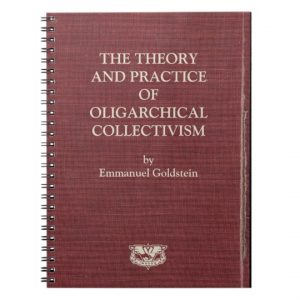
In this book, Winston studies the theories and methods of the Party itself. The book explains how the Party came to power, and how it maintains power through a process called doublethink, a mental process whereby people are able to believe what they are told while forgetting everything they know to actually be true.
Winston finds reassurance in the book since it confirms his ideas about the Party. Winston realizes that the only hope for real rebellion is by organizing the proles.
Winston is unable to finish the book before he and Julia are arrested. They had been set up the entire time by Charrington. An antique engraving on one of the walls of their rented room contained a telescreen placed there by Charrington who is in fact a member of the Thought Police. During the arrest of Winston and Julia, the police smash Winston’s glass paperweight and he and Julia are taken separately away. This is a highly symbolic moment. The emblem of their love, their relationship, and their commitment to the rebellion is smashed.
Winston is put in a windowless cell in the Ministry of Love. Other prisoners come and go until Winston is finally all alone. He is shocked to see O’Brien who reveals that he has been loyal to the Party the entire time. Over a period of weeks or possibly even months, Winston is beaten and interrogated by the Party officials—the Party Intellectuals– until they finally force him to confess to crimes they have made up.
The torture is escalated in order to break Winston. He is subjected to extreme pain and electric shocks designed to force him to not only confess to crimes but also to accept the Party doctrine.
O’Brien explains that the torture is really a kind of treatment designed to cure him of insanity. He is by definition insane by not accepting the Party rules and laws. Winston endures this torture for quite some time. He even openly says that he hates Big Brother. But he absently utters Julia’s name and with this he is taken to the terrifying Room 101 for the final phase of his “cure.”
In Room 101 each prisoner is forced to endure the one thing which most horrifies them. They know that Winston is terrified of rats and they put his head in a cage containing two rats set to devour his face. As O’Brien lowers the cage, Winston finally breaks. He begs for mercy and finally begs that Julia be tortured instead.
Winston is finally cured in the view of the Party and he is released. He spends his days at the Chestnut Tree Café drinking copious amounts of gin. He is given a new job is in a frivolous sub-committee in the Ministry of Truth.
Eventually Winston and Julia do see each other once in a park where they confess their betrayal. Winston no longer feels anything for Julia and really only wants only to return to the Chestnut Tree Café and drink gin. In the end, he sees an announcement on a telescreen that Oceania has won a victory over Eurasia. Winston is filled with joy for his new love for Big Brother. In fact, Winston is completely defeated. His joy is a really the hope that he will soon be executed.
Important Themes
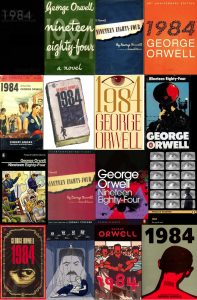
Might makes right in 1984 and we are invited to question this idea. The Party ultimately wins in the end, but the morality of the victory is compromised on every level. The brutality and ruthlessness of the Party wins out, but they are not “right.” The ending of the novel is profoundly disturbing and this questions the idea that might makes right.
Characters and Analysis
The 39-year old protagonist. Winston is a minor functionary in the Records Department of the Ministry of Truth. His job is re-write news articles so that they conform to the Party’s current version of truth and history. He is intelligent, meek, and introspective. Winston can see that the ultimate goal of the Party is gain absolute control over the people through an oppressive totalitarian system.
He secretly hates the Party and seeks to rebel. Orwell develops the introspection of this character to contrast the individual and the collective as well as the inner life of people against the totalizing scheme of ruling power. Winston is an intellectual who even takes the time to study the Party’s own system of justification. He is undermined by his own feelings of love, which renders him vulnerable.
Julia/ The dark-haired girl
Winston’s love interest. She is the 26-year old sexually rebellious girl who works in the Fiction Department of the Ministry of Truth. Julia is practical, rebellious, but uninterested in politics. She believes that the Party is unbeatable through open rebellion and that private disobedience is the only way to defeat them. Her rebellious nature inspired Winston to continue taking risks. She contrasts with Winston in that her wild nature is masked by her orthodox appearance in life.
O’Brien
The antagonist in the novel, O’Brien is a corrupt bureaucrat. He is a member of the Inner Party. O’Brien embodies the dehumanizing and dehumanized force of totalitarianism. Due to the fact that he is charismatic and is able to win the confidence of Winston early in the novel, he remains a paradox in the end. He is the immediate source of all of the torture and he is the voice of the Party for Winston. Yet, Winston begins to admire him in the end and even sees him as a salvation. The corruption of the human spirit is complete in O’Brien.
Mr. Charrington
Charrington is the owner of the junkshop where Winston buys the diary and the glass paperweight. He also owns the room that Winston and Julia rent for their secret meetings. He appears as a mild older man when in fact he is a member of the Thought Police. He is the one who turns Winston and Julia over to be arrested. Mr. Charrington symbolizes the omnipotent power and reach of the Thought Police and of the Party.
Quotations and Analysis
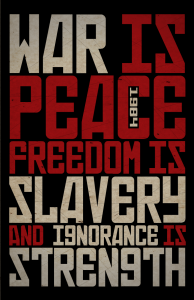
FREEDOM IS SLAVERY
IGNORANCE IS STRENGTH
These are the slogans engraved on the Ministry of Truth. They evoke the double think of the totalitarian regime of Oceania. The meaning and logic of the slogans run counter to all conventional sense and they reveal the mind-numbing force of the Party. All reality is what the Party says it is, even in the face of logic and reason. War is peace because with a common enemy, an individual can find peace. Freedom is slavery since the only way to be free is by being a slave to the collective will of the Party. Ignorance is strength because the individual finds strength only in the official knowledge of the party.
“Who controls the past controls the future. Who controls the present controls the past.”
The Party’s internal slogan, this represents the entire strategy of the Party. It is spoken twice in the novel; once in Book One, Chapter III while Winston thinks about the way the Party controls history and personal memory; again in Book Three, Chapter II as Winston talks to O’Brien about the nature of history. It is a perfect example of how the Party exerts control over history and truth to subvert individual ideas of both. The totalitarian power of the Party resides in its ability to exert all understanding of reality over individual will.
“And when memory failed and written records were falsified—when that happened, the claim of the Party to have improved the conditions of human life had got to be accepted, because there did not exist, and never again could exist, any standard against which it could be tested.”
From Book One, Chapter VIII, this demonstrates the far-reaching power of the Party. By not only erasing and re-writing history, but also eliminating any and all counter-claims to truth, the Party rendered it impossible to challenge their dominating version of truth. Even if a rebellion were to present a real challenge, there are no documents or records to support any of their claims. The only history and truth is the official version written and constantly re-written by the Party. This is the ultimate exertion of knowledge as a form of power.
“And perhaps you might pretend, afterwards, that it was only a trick and that you just said it to make them stop and didn’t really mean it. But that isn’t true. At the time when it happens you do mean it. You think there’s no other way of saving yourself and you’re quite ready to save yourself that way. You want it to happen to the other person. You don’t give a damn what they suffer. All you care about is yourself.”
Spoken toward the end by Julia to Winston as they talk about their experiences in Room 101. This quotation reveals the final triumph of the Party. They deny any real love, devotion, or dedication to each other and accept the Party’s version of what happened. The triumph of the brutal state over individual will is complete as they accept and admit their love was a lie and that their intentions were to hurt each other so as to prevent themselves from being hurt. They final claim is that there are no real motives beyond self-interest and individuals require a powerful central authority to ensure peace and order.
Symbolism
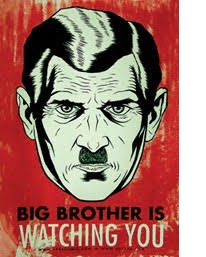
This is both the source of all power in the novel but also the symbol of the “benevolent dictatorship” of the party. It is a source of fear and the symbol of brotherly affection the Party holds toward the people. This is Orwell’s condemnation of central authority and the abuse they represent. Big Brother is the government, religion, and the police all in one image.
The glass paperweight
It is a symbol of a by-gone time. The craftsmanship required to make it no longer exists. It is also a fragile object that holds intense meaning for Winston. It is easily breakable and is broken just as the relationship between Winston and Julia and their individual sense of themselves. Anything fragile and unique is ultimately broken.
Victory Gin
In the end, Winston is reduced to excessively drinking Victory Gin. The victory is his freedom to drink himself to death — to anaesthetize himself in his complete defeat. Again, it is double think at work. The gin represents victory only for the Party and it is the symbol of complete and absolute defeat for the individual.
Key Facts
First published in 1949.
One of the classic examples of the dystopian novel, which consists of a vision of a terrifying future world of decay or erosion of humanity and human principles.
Orwell had been in Spain during the Civil War and had experienced WWII in London. He had witnessed first-hand the violence of totalitarian regimes as well as the effects of extreme government interference with the media. By setting his novel in London, he drew on the experiences and sympathies of others who had witnessed similar things.
The expression “Big Brother” is now so familiar that it stands as a metaphor for any oppressive and invasive system of government.
Other Novels
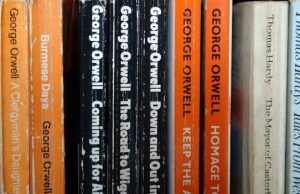
Burmese Days.
A Clergyman’s Daughter.
Keep the Aspidistra Flying.
The Road to Wigan Pier.
Homage to Catalonia.
Coming Up for Air.
Animal Farm.



